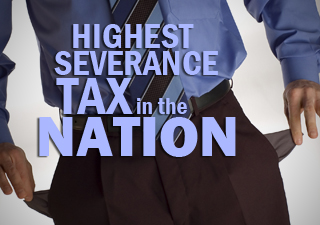Media

Who Pays For a Severance Tax?
Proponents of a new natural gas tax—which would be in addition to the existing impact fee (tax) and other taxes extractors already pay—ignore the consequences new taxes will have on working people.
In contrast, the Independent Fiscal Office’s analysis of Gov. Wolf’s severance tax proposal finds Pennsylvania families and businesses will pay the tax through higher energy prices. Even though 80 percent of the tax will be borne by consumers in other states, Pennsylvania residents will still shoulder a significant burden.
Households earning less than $100,000 will pay $180 million more annually in higher utility bills as a result of Gov. Wolf’s proposal.
| Tax Incidence for Pennsylvania Residents, FY 2018-19 | |||||||
| Net tax increase by household income under Wolf proposed budget, in millions | |||||||
| Under $25,000 | $25,000-$49,999 | $50,000-$74,999 | $75,000-$99,999 | $100,000-$250,000 | More than $250,000 | Total, Households less than $100,000 | |
| Tobacco | $126 | $149 | $96 | $80 | $78 | $26 | $451 |
| Sales and Use | $367 | $616 | $606 | $512 | $1,283 | $721 | $2,101 |
| Personal Income | $29 | $270 | $303 | $268 | $713 | $658 | $870 |
| Property | ($274) | ($472) | ($438) | ($352) | ($680) | ($284) | ($1,536) |
| Philadelphia Relief | ($58) | ($77) | ($61) | ($48) | ($100) | ($64) | ($244) |
| Renter Rebate | ($202) | ($185) | ($8) | $0 | $0 | $0 | ($395) |
| Corporate Net Income | ($25) | ($45) | ($41) | ($35) | ($87) | ($75) | ($146) |
| Bank Shares | $1 | $2 | $2 | $2 | $4 | $4 | $7 |
| Net Severance tax | $44 | $56 | $47 | $34 | $60 | $23 | $181 |
| Total | $8 | $316 | $506 | $461 | $1,271 | $1,009 | $1,291 |
| Source: Independent Fiscal Office: http://www.ifo.state.pa.us/resources/PDF/Revenue_Proposal_Analysis_April2015.pdf | |||||||
If enacted, Gov. Wolf’s proposed tax would be the highest effective rate in the country.
Further, as I pointed out in recent testimony, the tax would hinder job creation and economic growth. Using the STAMP model developed by the Beacon Hill Institute at Suffolk University, we found the proposed severance tax, with no other tax changes, would result in 4,138 fewer private sector jobs in fiscal year 2017.
Encacting a severance tax won’t result in free money from pots of gold found at the end of rainbows—it will be paid for by families through higher energy bills and by residents in the form of fewer job opportunities.